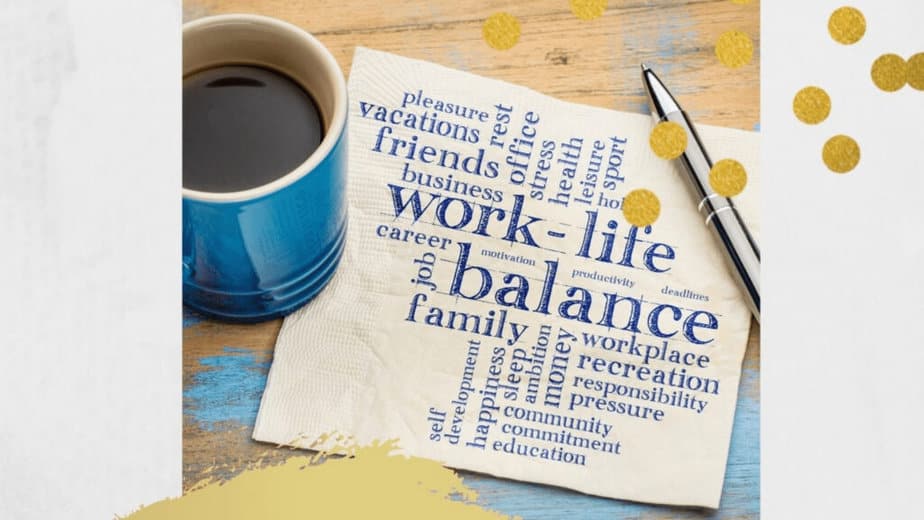Share this
Do you remember the last time you took a day off just for yourself? Or enjoyed a relaxing weekend without a single work email or call? It’s not uncommon to feel like work takes over our lives, leaving us with little time to focus on personal relationships, self-care, and other activities we enjoy. This is where achieving work-life balance becomes crucial. But what exactly is work-life balance? It refers to the ability to manage your work schedule in a way that allows you to prioritize personal and family time, hobbies, and other non-work activities.
Achieving a work-life balance isn’t only about creating more time for yourself, but it also has several benefits, including improved mental health, better relationships, and increased productivity. When work-life balance is off-kilter, there are telltale signs. Do you find yourself neglecting personal relationships, feeling burnt out, experiencing increased stress levels, and suffering from decreased productivity? These can all be signs of a work-life imbalance that needs readjustment.
Signs of work-life imbalance
Do you find yourself frequently checking your work emails after hours? Failing to make time for personal relationships? Feeling exhausted and unmotivated? These are all signs of a work-life balance imbalance. Neglecting personal relationships can be a significant indicator of an unhealthy balance. If you’re canceling plans with friends or family to work, it might be time to focus on reconnecting with loved ones. Decreased productivity can also occur, resulting in a cycle of overworking. Feeling burnt out is often a direct result of an imbalance between work and life.
If you’re not taking care of yourself, your mind and body will take notice. Increased stress levels can dangerously impact your overall health and well-being. It’s imperative to prioritize a healthy work-life balance to avoid these detrimental effects.
Ways to achieve work-life balance

Achieving a work-life balance is essential for your mental and physical well-being. Here are some practical tips for maintaining this balance.
- Setting realistic goals is the key to a healthy work-life balance. Understand your priorities and set achievable goals accordingly. Time management is vital, and you must learn to prioritize tasks to maximize productivity. Make sure to stay organized and focused on your objectives.
- Delegating tasks is an excellent way to reduce your workload and stress levels. Assign tasks to your team members or outsource work that you cannot handle yourself. Doing so not only means you will have more time for yourself, but it will also motivate your team and increase their productivity.
- Take breaks! Reward yourself with some downtime after prolonged periods of working. Stepping away from work, even for a few minutes, can leave you refreshed and recharged. This can boost creativity and improve overall productivity. Unplugging from work after hours is essential for recharging your batteries. There’s a reason why they call it “quality time.” Dedicate specific times to attend to work duties and strictly maintain them. After hours, focus on personal time activities and enjoying the present moment.
- Finding time for self-care is also a hurdle. When work demands are high, you might ignore your health and well-being. Prioritizing mental and physical health is necessary. Small steps like taking a break, indulging in a hobby, or even meditating for a few minutes can help recharge and stay focused.
- Time management plays a pivotal role in achieving work-life balance. Plan your days, weeks, and months in advance, allowing for dedicated time slots for work, family, personal growth, and relaxation. Prioritize tasks based on their importance and urgency, and consider utilizing productivity tools and techniques to optimize your time. By managing your time effectively, you can avoid feeling overwhelmed and create space for both professional and personal fulfillment.
- Open and effective communication is vital in maintaining a healthy work-life balance. Clearly articulate your needs, expectations, and limitations to your colleagues, supervisors, and loved ones. Expressing your concerns, requesting support when needed, and being open about your challenges can help prevent unnecessary stress and promote understanding and cooperation.
- Learning to say no is another factor that can greatly benefit your well-being. It’s important to set boundaries and not feel guilty when you need to prioritize your own time, even if it means declining work opportunities or social events.
- Incorporating physical activity into your routine is proven to have numerous health benefits. By finding a form of physical activity that you enjoy, whether it be yoga, cycling, or simply walking, you can reduce stress and prioritize your mental well-being.
Remember, maintaining a work-life balance is not easy, and it requires discipline and commitment. However, with time, it will become a habit and lead to an overall improvement in work quality and your personal life.
Benefits of work-life balance
Achieving a work-life balance may sound like a daunting task, but the benefits are worth the effort. Not only does it improve mental health, but it also has a positive impact on relationships, overall well-being, and productivity. When you have a healthy work-life balance, you can focus better on the task at hand. Increased productivity results from putting in the right amount of effort while taking adequate breaks to rest and recharge.
Maintaining a work-life balance also reduces the feeling and burnout, leading to greater job satisfaction. When you allocate time to outside activities such as spending time with family and friends, pursuing hobbies, or even practicing self-care, you feel fulfilled and energized.
When you return to work, you are refreshed and ready to perform better. Maintaining a balance between work and personal life also improves mental health. It helps reduce the feeling of overwhelm and burnout, leading to greater job satisfaction. When you allocate time to activities outside of work, whether it’s spending time with family and friends, pursuing hobbies, or even practicing self-care, you feel more fulfilled and energized.

Stronger relationships with family and friends also come from a balanced life. Communicating with loved ones, spending quality time with them, and being present at the moment helps foster deeper connections. Overall, achieving a work-life balance leads to a better quality of life. It helps reduce stress, improve mental health, and strengthen bonds with loved ones. So, if you’re looking to live your best life, prioritize achieving a healthy work-life balance.
Challenges you may face
Maintaining work-life balance may sound easy in theory, but in reality, it’s a constant struggle. It’s common to find yourself being tempted to work during off hours, especially when your boss or colleagues expect you to be available and responsive at all times. The fear of missing out or being perceived as unproductive can be overwhelming, leaving you with no choice but to neglect your personal life.
Another challenge is setting boundaries with others. When your work life is hectic, it’s easy to forget that you have a life outside of it. Friends and family may expect you to be present and available when you’re not working, but it’s essential to communicate your boundaries clearly. You need to be firm and assertive about your priorities and make it clear that you need time away from work.
Balancing multiple roles and responsibilities can lead to guilt when you feel like you’re not giving enough attention or time to either work or personal life. It’s common to overcommit and struggle with saying no to additional tasks or responsibilities, which can further exacerbate the imbalance.
Small steps like taking a break, indulging in a hobby, or even just meditating for a few minutes can help you recharge and stay focused. The key to overcoming these challenges is recognizing your limitations and understanding the importance of work-life balance. It’s okay to step back, take a break and seek help if you need it. Remember that your mental and physical health should always come first.
Conclusion
We hope you found the blog post informative and insightful. Achieving work-life balance is essential for anyone looking to lead a happier, healthier life, and it’s crucial to recognize your own limitations and priorities to achieve it. Take time to set realistic goals, prioritize tasks, delegate responsibilities, and unplug from work after hours. Start small and make self-care a habit. You deserve it!
FAQs
Work-life balance is the ability to manage your work schedule in a way that allows you to prioritize personal and family time, hobbies, and other non-work activities.
Neglecting personal relationships, feeling burnt out, experiencing stress levels, and suffering decreased productivity are all signs of work-life that need readjustment.
Achieving work-life balance is crucial for maintaining overall well-being. It helps prevent burnout, reduces stress levels, improves relationships, enhances productivity, and allows you to lead a more fulfilling life by dedicating time and attention to both work and personal commitments.
Some achieving balance include realistic goals, learning to delegate tasks, taking breaks, and unplugging from work after hours.
Effective communication involves expressing your needs, expectations, and limitations clearly. Communicate with colleagues, supervisors, and loved ones about your challenges and concerns. By fostering open and supportive communication, you can create understanding and cooperation, leading to a healthier work-life balance.



